Apr 2, 2024 12:59 PM
Saxophonist, Sonic Explorer Casey Benjamin Dies at 45
Casey Benjamin, the alto saxophonist, vocalist, keyboardist and producer who stamped his distinctive sounds on the…
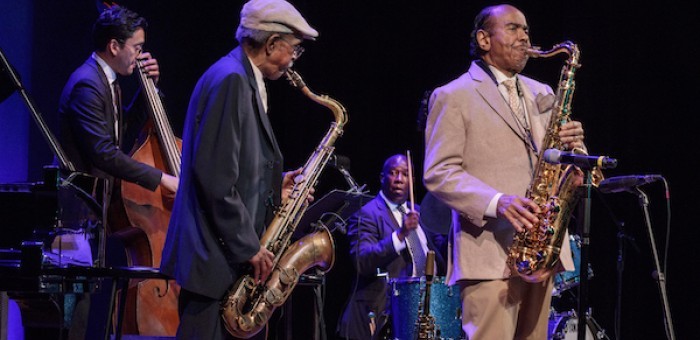
David Wong (left), Jimmy Heath, Kenny Washington and Benny Golson perform at the 92nd Street Y in New York on July 19.
(Photo: Richard Termine)“Jazz is alive at the 92nd Street Y,” WBGO radio personality Rhonda Hamilton announced to the sold-out house that filled the Upper East Side cultural center’s auditorium on the night of July 19. The occasion: the historic team-up of NEA Jazz Masters Benny Golson, 88, and Jimmy Heath, 90, in a concert fittingly titled Meeting of the Maestros.
The Y’s 33rd Annual Jazz In July Festival had gotten off to an auspicious start the previous evening, feting the series’ founding music director Dick Hyman with the concert Dick Hyman Forever: Celebrating His 90th Birthday, in which the veteran pianist was honored with a proclamation by New York City Mayor Bill de Blasio that July 18 would be known as Dick Hyman Day.
Hamilton told the audience to get ready for “a hot night of cool jazz at the 92nd Street Y,” then turned the podium over to the current Festival Music Director, pianist Bill Charlap, who promptly introduced his rhythm section mates for the evening: bassist David Wong and drummer Kenny Washington. “If there’s a Mount Rushmore of Jazz, they’re on it,” Charlap noted, introducing Golson and Heath. He described the pair as “two icons of music.” As they strode to center stage, tenors in hand, the pair was met with a thunderous round of applause.
Taking his seat at the piano, Charlap called out “All The Things You Are,” counting off a brisk medium-up tempo to the classic Jerome Kern melody, which the two tenors played with a single voice that revealed a shared history (beginning with their Philadelphia roots). Golson was first to step into the solo spotlight, delivering a heady improvisation over Wong’s steady walking bass and Washington’s crisp drumming. The saxophonist projected a smooth, robust sound that has only grown more personal with age. Heath followed, his dark, distinctive tone building on his longtime friend’s fluid lines as if they were his own. Charlap and Wong were up next, each musician demonstrating a virtuosic command of his instrument.
“Every composition that these men have written is a classic, and we’re going to play one now,” Charlap asserted as Golson exited stage right, only to be replaced in the frontline by trumpeter Jeremy Pelt. The ensemble then performed Heath’s “C.T.A.,” one of the saxophonist’s earliest compositions, first recorded by Miles Davis. The piece has held its place in the jazz canon for more than half a century, easily living up to Charlap’s description.
The horns burned through the bebopping lines buoyed by the pianist’s astute chordal comping and Washington’s taut accents and surging snare-drum rolls, with Heath stretching for several choruses, followed by Pelt, whose powerful sound placed him squarely in the Clifford Brown-Lee Morgan-Donald Byrd pantheon of hard-bop trumpeters. Charlap bopped hard too, after which the horns traded fours and eights with Washington, leading into a climactic drum solo.
Heath picked up his soprano to begin his stirring “The Voice Of The Saxophone,” an absorbing movement from his celebrated extended work The Afro-American Suite Of Evolution. Heath’s performance of the beautiful piece, which is dedicated to Coleman Hawkins, began with a poignant unaccompanied soprano solo introduction. Playing with impassioned intensity, Heath rekindled the romantic sound for which Hawkins was renowned, though with a brighter timbre. Then, after Charlap’s chorus, he took up his tenor for a darker solo outing rife with Ellingtonian elegance, ending with an acapella cadenza that brought the crowd to its feet.
Golson and Pelt returned to the stage to perform Golson’s “Whisper Not,” which Charlap justly described as “one of the true standards of the repertoire of American music.” Introduced at a medium-slow tempo, the beauty of the classic melody came to the fore.
Golson soloed first with compelling lyricism, unveiling fresh ideas on lines he’s played a thousand times. Pelt continued, blowing with restrained virtuosity, interjecting upper register blasts for dramatic effect. Charlap’s articulate solo brought an attentive Golson to the piano’s edge, with the composer displaying his approval at the solo’s conclusion with a congratulatory handshake. The quintet followed with another of Golson’s classics, “Stablemates,” after which Heath returned to the bandstand to close out the first half of the show in a tour de force two-tenor performance of “What Is This Thing Called Love.”
The Heath-Pelt quintet opened the concert’s second segment with a powerful rendition of the saxophonist’s modernist “Gingerbread Boy” (which, like his “C.T.A.,” achieved wide notoriety as part of Miles Davis’ repertoire), along with his cleverly titled “A Sound For Sore Ears.”
Golson then took Heath’s place on stage to perform two more of his own famous compositions with Pelt: the trumpet feature “I Remember Clifford” and the Jazz Messenger staple “Whisper Not.” The show came to an exciting finish with Heath returning to join Golson, Pelt, Charlap, Wong and Washington for a blues, with everyone taking their turn for a Jazz at The Philharmonic-style jam on Milt Jackson’s soulful “Bag’s Groove.” DB
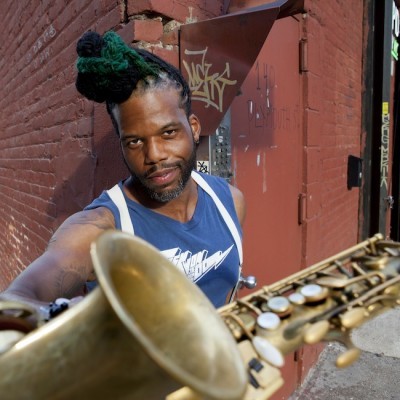
Benjamin possessed a fluid, round sound on the alto saxophone, and he was often most recognizable by the layers of electronic effects that he put onto the instrument.
Apr 2, 2024 12:59 PM
Casey Benjamin, the alto saxophonist, vocalist, keyboardist and producer who stamped his distinctive sounds on the…
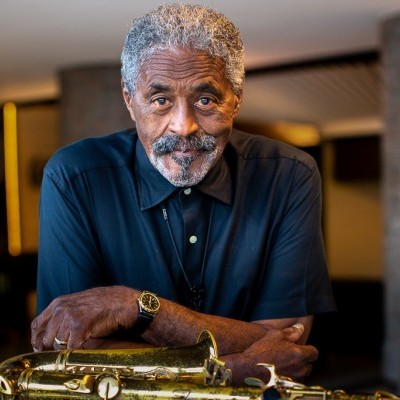
“He’s constructing intelligent musical sentences that connect seamlessly, which is the most important part of linear playing,” Charles McPherson said of alto saxophonist Sonny Red.
Feb 27, 2024 1:40 PM
“I might not have felt this way 30 to 40 years ago, but I’ve reached a point where I can hear value in what people…
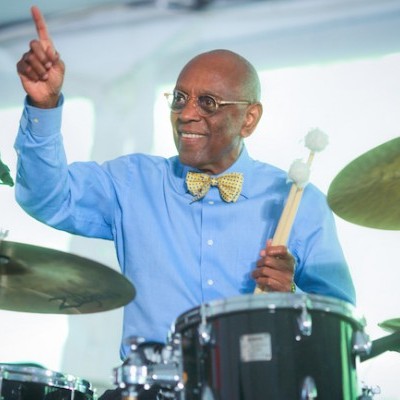
Albert “Tootie” Heath (1935–2024) followed in the tradition of drummer Kenny Clarke, his idol.
Apr 5, 2024 10:28 AM
Albert “Tootie” Heath, a drummer of impeccable taste and time who was the youngest of three jazz-legend brothers…
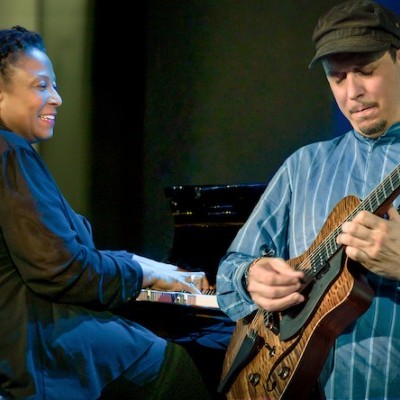
“Both of us are quite grounded in the craft, the tradition and the harmonic sense,” Rosenwinkel said of his experience playing with Allen. “Yet I felt we shared something mystical as well.”
Mar 12, 2024 11:42 AM
“There are a few musicians you hear where, as somebody once said, the molecules in the room change. Geri was one of…
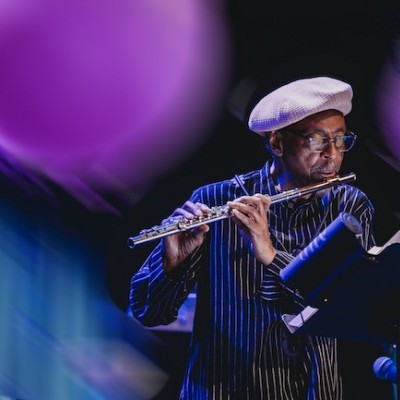
Henry Threadgill performs with Zooid at Big Ears in Knoxville, Tennessee.
Apr 9, 2024 11:30 AM
Big Ears, the annual four-day music celebration that first took place in 2009 in Knoxville, Tennessee, could well be…